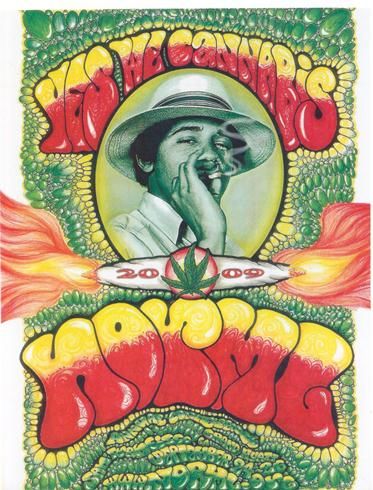This is a guest post by Todd Mintz. Opinions expressed in the article are those of the guest author and not necessarily Techipedia/Tamar Weinberg.
“Come on, Sandy, baby, loosen up. You’re too tight.”
John Riggins speaking to Sandra Day O’Connor

Getting stoned hasn’t always been about the 420.
In biblical times, it was something to be feared since it was a punishment handed out to non-believers. Ray Charles referenced hard liquor as his “instrument for stoning”. To Bob Dylan, “stoning” is used as a metaphor to show society’s way of oppressing its citizens. However, the rise of the cannabis culture in the 60’s cemented its current definition that we all know and love.
So, what does this have to do with social media?
People who use social media correctly tend to exhibit some of the more overt characteristics of people chemically influenced (and those who use social media badly exhibit either characteristics of teetotalers or people over-chemically influenced).
I know most of y’all know how people act when they’re wasted but let’s have Wikipedia specify what some of these reefer-induced traits are…
… an altered state of consciousness, euphoria, feelings of well-being, relaxation or stress reduction, increased appreciation of humor, music or art, joviality, metacognition and introspection, enhanced recollection (episodic memory)… One of the more peculiar effects of cannabis is the distortion of the perception of time and space (where experiencing an up rush of ideas from the bank of long-term memory can create the subjective impression of long elapsed time, while a clock reveals that only a short time has passed).
If one were to describe the art of “effective partying”, it would be to imbibe enough “substance” so that the person loses enough of their inhibitions to be more attractive to the people around them (yet having enough restraint so as not to be overly obnoxious). The ideal state of intoxication is when people (literally and metaphorically) let their hair down, roll their sleeves up, and unbutton a couple shirt buttons. The true social media experts project this level of comfort, familiarity, and intimacy in each and every online interaction, even with total strangers. However, behind the combination of charisma and seeming spontaneity is a controlled person very much in character…their character being an enhanced, accentuated version of themselves.
In a long-ago interview with Wired, Professor & Author Mihaly Csikszentmihalyi defined a person being in the “Flow” as
Being completely involved in an activity for its own sake. The ego falls away. Time flies. Every action, movement, and thought follows inevitably from the previous one, like playing jazz. Your whole being is involved, and you’re using your skills to the utmost.
Take the aforementioned physical & psychological effects of marijuana and map them onto a person’s emotional state and you get a person in the “Flow”. In the social media sphere, the aces of social media can tap into their “Flow” at will (without chemical assistance) to either begin a conversation or continue one that’s already started, making them both attractive to others and an effective representative of themselves / their business.
Unless the person in question has earned social media deity status where even their most tiresome ramblings generate a high volume of comment and conversation, anyone attempting to seed a new conversation needs to earn the attention of their potential audience. Sure, mundane minutiae (like the sort lampooned here) might generate a low level dialog, but in order to achieve something more meaningful, a successful social media marketer needs a conversational hook to generate discussion. A while back, Todd Malicoat wrote about linkbaiting hooks…however, each and everything he says in his post can be mapped into the social media sphere. To increase the odds of meaningful conversational engagement, the initial dialogue should be ultra-resourceful…or humorous…or controversial…or valuable…or…
How to do this successfully? Be genuine. Also, part of this process is developing an acute self-awareness of your strengths and weaknesses as a marketer (and as a person). In my experience, I’ve found that I’m quite successful at making people laugh via social media. If I’m in a particularly wicked, edgy mood (and feel in the “Flow”), I’ll push the humor and if I’m getting good feedback to my funny conversation, I’ll keep it rockin’. However, I’m acutely sensitive to the fact that I don’t always feel humorous nor do I always anything funny to contribute…and then, I try to be resourceful (or stay quiet). Successful social media folks know when to accelerate, when to shift gears, and when to put on the brakes.
Speaking of humor, here’s a little something I found extremely funny…
Now, being a valued participant in other people’s conversations is the other integral part of the social media experience. As much as you might want to leave your social media (Big)footprint everywhere you walk online, when you’re joining someone else’s conversation, it’s like being a guest in their house. You can still draw attention to yourself and use one of the aforementioned content hooks…however, you need to remember that your role is to advance the conversation, not take it over, and that furthering the dialogue ultimately furthers your social media brand & helps you develop relationships with all the participants. If you’re skilled in the art of social media “Flow”, switching gears between being a conversational leader to a contributor (and back) should be natural and easy as you engage others across various platforms.
The quality of most people’s personal interactions peak about the two drink stage (before dropping rapidly after the jello shots arrive…). If you want to get better at using social media, try to channel how you behave at your “social peak” into your social media activities. Make sure you put yourself in a wide variety of social media situations over and over again…endless repetition in social media (like with many other things) is the key to peak performance. Also, look at the people you follow and admire in social media and ask yourself whether you can distill their core traits of effectiveness into your own online interactions. Social media proficiency isn’t natural to most of us…however with lots of practice, feedback, and perhaps a little coaching, you can greatly improve the quality and quantity of your social media relationships (which can help your offline relationships as well).
Now if you actually get stoned before using social media, you might end up on one of Ben Huh’s websites…

(Source)
Todd Mintz is on the Board of Directors at SEMpdx, runs his own search marketing gigs and tweets quite a bit.

![Confessions and Reflections of a [Former] Digg Addict](http://www.techipedia.com/wp-content/uploads/2008/05/digg-logo.jpg)



I’ve honestly never made the correlation before, but you’ve got a point there. Especially your bit of guidance at the end!
Be genuine but skillful. Fascinating article. 🙂 Social media to me, is a life long lesson. There will never be a sure-win plan that applicable to all. Social media seems easy yet complicated to master if you can’t figure out your ‘trait’. I love when you mention about putting ourselves in social media variations (situations) and be observant to influencers. I have much to accomplish and certainly wouldn’t want to be stoned. ;P Appreciate the enlightenment.
@wchingya
Social/Blogging Tracker
Some people don’t mind ending up like that cat… I think balance is critical when it comes to Social Media.
I found this to be very informational and humerous!! I get it!! I’m involved in social interactions quite a bit!! I’m going to take what I learned from you and use it to help in making better connections with other’s!! Thankyou!! I’m also glad your bringing enlightment to people who are still ignorant about the whole cannibus issue!! I’ve been using it medicinnally for a few years now, And have gotten off all the antideppressants I was on!! And lost all the weight from those bad drugs!! Once again, Thanks so much!! Many Blessings!! Tamre’
Very good article.
Too many unspoken rules in Social Media, @max too true